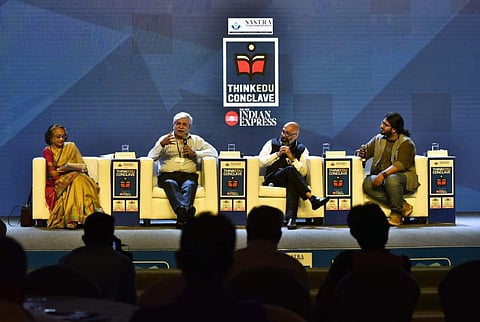

'How to deal with depression?' is a question that most youngsters, especially teenagers, seem to ask themselves (and the internet) and mostly end up ignoring it, often at the cost of their overall well-being, because of the mental health taboo in our society. At the ThinkEdu Conclave 2020 organised by The New Indian Express in Chennai on January 8, an eminent panel of mental health experts attempted to decode the looming D-word and explain what exactly the proverbial 'pursuit of happiness' actually entails.
“If we ask youngsters what makes them happy, they would say 'no academic pressure, no pressure to play football, be in a band, play cricket or even have 6 lakh followers on Instagram' would make them happy. Alternatively, some others will say 'academic excellence, high paying jobs, being the best, developing high self-expectations' would make them happy. You see, both are two ends of a spectrum,” said Saras Bhaskar, counselling psychologist and coach to Daniel Thimmayya, Chief Reporter, The New Indian Express, who was chairing the session.
Discussing what happiness has got to do with depression, she said, “I see happiness and depression as two separate entities. Do you want to be happy or anti-happy? Being happy involves planning, prioritising, organising and some self-discipline. Now just think about it — if you decide to become a Formula One racer, don't you need all the above to reach your goal? The truth is it is easy to develop anti-happiness when one does not have a vision, plan and/or self-discipline. As a psychologist, I see that anti-happiness and depression are related. Depression is a state of hopelessness and helplessness — environmental factors or genetic disposition. However, both can be combated if recognised and given appropriate intervention.”
Saras also stated the five reasons why Indian students become depressed in her view — parent and peer influences, academic pressure and career path, identity conflicts, self-imposed grandiosity and love relationships. “15 years ago, only third-year college students would talk about dumping and getting dumped. But even 10th graders today talk about committed relationships,” she commented as the audience erupted into peals of laughter. “Committed relationships do not involve wearing the clothes that your boyfriend or girlfriend wants you to or sending emojis, it is about planning, prioritising and organising. We all play several roles in our life. Besides being students, what other roles do you play, apart from being a boyfriend or girlfriend?” she asked the audience. “Brother, sister, friend...” yelled members of the audience, to which she remarked, ”Absolutely!” Saras ended her remarks by emphasising on the 'balancing act', “If you are able to juggle several roles, depression won't hit you. Balancing those roles and putting them in order of priority is important. When it comes to making choices, it is not about instant gratification. You should consider long-term consequences. Then, depression will run away from you.”
Well-known neurophysicist Dr ES Krishnamoorthy explained the science behind being happy while addressing the full house. “The ability of the neurons in the brain to work well, the way the left brain and right brain can work in tandem, and the brain's ability to generate enough dopamine and other chemicals to feel rewarded — all these affect how happy you feel,” he said, adding, “What makes you feel happy is your ability to feel rewarded. According to the Genetic Theory of Happiness, there is a 'micro umbrella' and a 'macro umbrella'. The micro umbrella is related to the impact and investment you make in your micro-environment — your family, school, friends. Then there is a macro umbrella, which relates to what you do for your community. What is interesting is that the macro umbrella is stimulated not through material rewards but through altruism — what you can do for other people, without expecting a reward. This means that we are hardwired to feel happy when we are contributing to our communities.”
Krishnamoorthy focused on the fact that the happiest people are those who stimulate both their micro and macro umbrellas. “Interactions are those that make you happy — interactions with loved ones, interactions that yield meaningful rewards, etc —those are the things that you should pursue,” he advised the audience.
'Happiness begins with loving yourself' is an idea that Dr Vijay Nagaswami, an eminent psychiatrist and author propagated during the session. “We need to understand a couple of things. Life is unfair. Relationships suck, but we cannot do without them. We need to first understand our relationship with ourselves — who are we, what are we, what do we want, what is our sexuality, etc. This is the first step towards attaining happiness,” he said. He pointed out that peer pressure and not 'fitting in' makes us develop a negative view of ourselves and the world around us, which makes us depressed. “The only way to counter these negative feelings is through developing life skills and relationship skills. Make mistakes and learn from them. We need to know how to negotiate with ourselves in a non-confrontational, non-judgmental kind of way," he explained. He also pointed out that we need to understand that being depressed is okay and not a matter of shame. “We need to always assure somebody who is depressed that it is okay to feel low and that help is always available in terms of therapy or other interventions,” he added.
